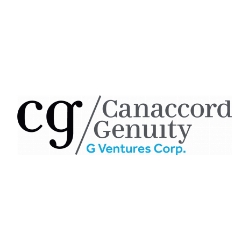Fintech
Canaccord Genuity G Ventures Corp. Announces Completion of Initial Public Offering

Toronto, Ontario–(Newsfile Corp. – July 23, 2021) – Canaccord Genuity G Ventures Corp. (NEO: CGGV.UN) (“CGGV“) is pleased to announce the closing (the “Closing“) of its initial public offering (the “Offering“) of 5,000,000 Class A restricted voting units of CGGV (the “Class A Restricted Voting Units“) at an offering price of $3.00 per Class A Restricted Unit for gross proceeds of $15,000,000. CGGV has granted the Underwriters (as defined below) a 30-day option following closing of the Offering to purchase up to an additional 750,000 Class A Restricted Voting Units, at a price of $3.00 per Class A Restricted Voting Unit (the “Over-Allotment Option“) for additional gross proceeds of up to $2,250,000 to cover over allotments. The gross proceeds from the Offering were (and the proceeds from any exercise of the Over-Allotment Option will be) deposited into an escrow account pending completion of a qualifying transaction by CGGV and will only be released upon certain prescribed conditions, as further described in CGGV’s final prospectus dated July 13, 2021 (the “Final Prospectus“).
Each Class A Restricted Voting Unit is comprised of a Class A restricted voting share (a “Class A Restricted Voting Share“) and one-half of a share purchase warrant (each whole warrant being referred to as a “Warrant“). Each Warrant will entitle the holder to purchase one common share of CGGV (a “Common Share“) for a purchase price of $3.45, commencing 30 days after the completion of its qualifying transaction, and will expire on the day that is five years after the closing date of the qualifying transaction or earlier. Prior to any qualifying transaction, the Class A Restricted Voting Shares and Warrants comprising the Class A Restricted Voting Units will trade as a unit. Each Class A Restricted Voting Unit will separate following the closing of the qualifying transaction into one Common Share and one-half of a Warrant. Following completion of the qualifying transaction, (i) the Class A Restricted Voting Shares will convert into Common Shares and (ii) the Common Shares and the Warrants will separate and trade separately.
The Class A Restricted Voting Units will commence trading today on the Neo Exchange Inc. under the symbol CGGV.UN. The Class B shares in the capital of CGGV (the “Class B Shares“) issued to CG G-Corp (as defined below) and certain directors of CGGV will not be listed prior to the qualifying transaction, as described in the Final Prospectus.
The Offering was distributed by Canaccord Genuity Corp. and Cormark Securities Inc. as co-lead underwriters and joint bookrunners (collectively, the “Underwriters“).
The sponsor of CGGV is CG G-Corp Sponsor Inc. I (“CG G-Corp“), a wholly-owned subsidiary of Canaccord Genuity Group Inc. and an affiliate of Canaccord Genuity Corp. (“Canaccord Genuity“). Concurrent with the Closing, CG G-Corp purchased 4,883,333 share purchase warrants (the “Founders’ Warrants“) at an offering price of $0.30 per Founders’ Warrant, for an aggregate purchase price of $1,465,000. Except as otherwise disclosed in the Final Prospectus, the Founders’ Warrants are subject to the same terms and conditions as the Warrants underlying the Class A Restricted Voting Units. When aggregated with existing shares owned by CG G-Corp, CG G-Corp owns 1,392,500 Class B Shares and 4,883,333 Warrants, representing an approximate 96.9% interest in the Class B Shares and approximately 19.4% of the total Class A Restricted Voting Shares and Class B Shares, taken together, assuming full exercise of the Over-Allotment Option and no relinquishment by the Sponsor of any of its Class B Shares.
CG G-Corp’s position in CGGV was acquired for investment purposes. CG G-Corp is restricted from selling its Class B Shares and Founders’ Warrants, as described in the Final Prospectus. CG G-Corp may purchase and/or sell any Class A Restricted Voting Units it acquires from time to time, subject to applicable law. In connection with the Offering, and as Sponsor to CGGV, CG G-Corp entered into certain material agreements, all as described in the Final Prospectus.
CGGV’s head and registered offices are located at 161 Bay Street, Suite 3000, Toronto, Ontario M5J 2S1. CG G-Corp’s head and registered offices are located at 161 Bay Street, Suite 3000, Toronto, Ontario M5J 2S1.
Wildeboer Dellelce LLP is acting as legal counsel to CGGV and CG G-Corp. Blake, Cassels & Graydon LLP is acting as legal counsel to the Underwriters.
This press release is not an offer of securities for sale in the United States, and the securities may not be offered or sold in the United States absent registration or an exemption from registration. The securities have not been and will not be registered under the United States Securities Act of 1933.
About Canaccord Genuity G Ventures Corp.
CGGV is a newly organized growth-focused special purpose acquisition corporation incorporated under the laws of the Province of Ontario for the purpose of effecting a qualifying transaction within a specified period of time.
About CG G-Corp Sponsor Inc. I
CG G-Corp is the sponsor of CGGV. CG G-Corp is a wholly-owned subsidiary of Canaccord Genuity Group Inc., a leading independent, full-service financial services firm, with operations in two principal segments of the securities industry: capital markets and wealth management.
Forward-Looking Statements
This press release may contain forward‐looking information within the meaning of applicable securities legislation, which reflects CG G-Corp’s and CGGV’s current expectations regarding future events. Forward‐looking information is based on a number of assumptions and is subject to a number of risks and uncertainties, many of which are beyond CG G-Corp’s or CGGV’s control, which could cause actual results and events to differ materially from those that are disclosed in or implied by such forward‐looking information. Such risks and uncertainties include, but are not limited to, failure to complete a qualifying transaction and the factors discussed under “Risk Factors” in the Final Prospectus, a copy of which is available on SEDAR at www.sedar.com. Neither CG G-Corp nor CGGV undertake any obligation to update such forward‐looking information, whether as a result of new information, future events or otherwise, except as expressly required by applicable law.
FOR FURTHER INFORMATION PLEASE CONTACT:
Canaccord Genuity G Ventures Corp.
Michael Shuh
Chief Executive Officer
(416) 869-7376
NOT FOR DISTRIBUTION TO U.S. NEWSWIRES OR DISSEMINATION IN THE UNITED STATES
Fintech
Fintech Pulse: Your Daily Industry Brief (Chime, ZBD, MiCA)

As we close out 2024, the fintech industry continues to deliver headlines that underscore its dynamism and innovation. From IPO aspirations to groundbreaking regulatory milestones, today’s updates highlight the transformative power of fintech partnerships, regulatory evolution, and disruptive technologies. Here’s what you need to know.
Chime’s Quiet Step Toward Public Markets
Chime, the U.S.-based financial technology startup best known for its digital banking services, has taken a significant step by filing confidential paperwork for an initial public offering (IPO). As one of the most valuable private fintechs in the U.S., Chime’s move could potentially signal a renewed appetite for fintech IPOs in a market that has been cautious following fluctuating valuations across the tech sector.
With a valuation that reportedly exceeded $25 billion in its last funding round, Chime’s IPO could set a new benchmark for the industry. Observers note that its strong customer base and revenue growth may make it an appealing choice for investors seeking to capitalize on the digital banking boom. However, the timing and success of the IPO will depend on broader market conditions and the regulatory landscape.
Source: Bloomberg
ZBD’s Pioneering Achievement: EU MiCA License Approval
ZBD, a fintech company specializing in Bitcoin Lightning network solutions, has made history by becoming the first to secure an EU MiCA (Markets in Crypto-Assets Regulation) license. This landmark approval by the Dutch regulator positions ZBD at the forefront of compliant crypto-fintech operations in Europe.
MiCA, which aims to harmonize the regulatory framework for crypto-assets across the EU, has been a focal point for industry players aiming to establish legitimacy and expand their offerings. ZBD’s achievement not only validates its operational rigor but also sets a precedent for other fintech firms navigating the evolving regulatory landscape.
Industry insiders view this as a strategic advantage for ZBD as it broadens its footprint in Europe. By leveraging its regulatory approval, the company can accelerate its product deployment and establish trust with institutional and retail users alike.
Source: Coindesk, PR Newswire
The Fintech-Credit Union Synergy: A Blueprint for Innovation
The convergence of fintechs and credit unions continues to reshape the financial services ecosystem. Collaborative initiatives, such as the one highlighted in the recent partnership between fintech innovators and credit unions, are proving to be a potent force in delivering tailored financial solutions.
This “dream team” approach allows credit unions to leverage fintech’s technological expertise while maintaining their community-focused ethos. Key areas of collaboration include digital payments, personalized financial management tools, and enhanced loan processing capabilities. These partnerships not only enhance member engagement but also enable credit unions to remain competitive in an increasingly digital-first financial environment.
Industry analysts emphasize that such collaborations underscore a broader trend of traditional financial institutions embracing fintech-driven solutions to bridge service gaps and foster innovation.
Source: PYMNTS
Tackling Student Loan Debt: A Fintech’s Mission
Student loan debt remains a pressing issue for millions of Americans, and a Rochester-based fintech aims to offer relief through its cloud-based platform. This innovative solution is designed to simplify loan management and provide borrowers with actionable insights to reduce their debt burden.
The platform’s features include repayment optimization tools, personalized financial education, and seamless integration with loan servicers. By addressing the complexities of student loan management, this fintech is empowering borrowers to make informed decisions and achieve financial stability.
As the student loan crisis continues to evolve, solutions like this highlight the critical role fintech can play in addressing systemic financial challenges while fostering financial literacy and inclusion.
Source: RBJ
Industry Implications and Takeaways
Today’s updates underscore several key themes shaping the fintech landscape:
- Regulatory Milestones: ZBD’s MiCA license approval exemplifies the importance of regulatory compliance in unlocking growth opportunities.
- Strategic Partnerships: The collaboration between fintechs and credit unions demonstrates the value of combining technological innovation with traditional financial models to drive customer-centric solutions.
- Market Opportunities: Chime’s IPO move reflects a potential revival in fintech public offerings, signaling confidence in the sector’s long-term prospects.
- Social Impact: Fintech’s ability to tackle systemic issues, such as student loan debt, showcases its role as a force for positive change.
The post Fintech Pulse: Your Daily Industry Brief (Chime, ZBD, MiCA) appeared first on News, Events, Advertising Options.
Fintech
SPAYZ.io prepares for iFX EXPO Dubai 2025

Leading global payments platform SPAYZ.io has confirmed it will be attending iFX EXPO Dubai 2025 on 14 to 16 January. Exhibiting at Stand 64 at Trade Centre Dubai, SPAYZ.io’s team of professionals will be on hand providing live demonstrations of its renowned payment services for payment providers. Attendees will also receive exclusive insight into SPAYZ.io’s plans for 2025 alongside early early access to its upcoming plans for the new year.
SPAYZ.io delivers a host of payment solutions that leverage the latest technological innovations and open access to the fastest growing emerging markets across Africa, Europe and Asia. Over the past year, there has been huge demand for its Open Banking and local payment method services, alongside bank transfers, mass payouts, online banking and e-wallets.
Yana Thakurta, Head of Business Development at SPAYZ.io commented: “We look forward to once again participating at iFX Dubai to expand our network of partners and clients. It’s a fantastic way to kick off the year, connecting with thousands of industry leaders from FOREX platforms to trading companies, and everything in between.
“Our key goal for iFX Dubai EXPO 2025 is to expand our portfolio of solutions and geographies. We’re using this as an opportunity to partner with like-minded entities who share our ambition to provide payment solutions that are truly global.”
Come meet SPAYZ.io’s team at the Trade Centre Dubai at Stand 64. You can also book a meeting slot with a member of a team.
The post SPAYZ.io prepares for iFX EXPO Dubai 2025 appeared first on News, Events, Advertising Options.
Fintech
Airtm Enhances Its Board of Directors with Two Strategic Appointments

Airtm, the most connected digital dollar account in the world, is proud to announce the addition of two distinguished industry leaders to its Board of Directors: Rafael de la Vega, Global SVP of Partnerships at Auctane, and Shivani Siroya, CEO & Founder of Tala. These appointments reflect Airtm’s commitment to innovation and financial inclusion as the company enters its next phase of growth.
“We are thrilled to welcome Rafael and Shivani to Airtm’s Board of Directors,” said Ruben Galindo Steckel, Co-founder and CEO of Airtm. “Their unique perspectives and proven track records will be invaluable as we continue scaling our platform to empower individuals and businesses in emerging markets. Together, we’ll push the boundaries of financial inclusion and innovation to create a more connected and equitable global economy. Rafael and Shivani bring a wealth of experience and strategic insight that will strengthen Airtm’s mission to connect emerging economies with the global market.”
Rafael de la Vega, a seasoned leader in fintech global partnerships and technology innovation, is currently the Global SVP of Partnerships at Auctane. With a proven track record of delivering scalable, impactful solutions at the intersection of fintech, innovation, and commerce, Rafael’s expertise will be pivotal as Airtm continues to grow. “Airtm has built a platform that breaks down barriers and opens up opportunities for people in emerging economies to connect to global markets. I am excited to contribute to its growth and help further its mission of fostering financial inclusion on a global scale,” said Rafael.
Shivani Siroya, CEO and Founder of Tala, is a pioneer in financial technology, renowned for empowering underserved communities through access to credit and essential financial tools. Her leadership in leveraging data-driven innovation aligns seamlessly with Airtm’s vision of creating more equitable financial opportunities. “Empowering underserved communities has always been at the core of my work, and Airtm’s mission resonates deeply with me. I’m thrilled to join the Board and work alongside such a dynamic team to expand access to financial tools that truly make a difference in people’s lives,” said Shivani.
The post Airtm Enhances Its Board of Directors with Two Strategic Appointments appeared first on News, Events, Advertising Options.
-

 Fintech PR6 days ago
Fintech PR6 days agoOutsourced Accounting Service: The New Standard for Business Finance Industry
-

 Fintech PR6 days ago
Fintech PR6 days agoBybit Launchpad Onboards Xterio, Opening up Opportunities in Blockchain Gaming for Users
-

 Fintech PR6 days ago
Fintech PR6 days agoCKGSB Professor Mei Jianping Launches Global Indices Tracking Impressionist, Contemporary, and Chinese Art Markets
-

 Fintech PR6 days ago
Fintech PR6 days agoIBN Technologies Sets the Benchmark in Financial Management Accounting Excellence
-

 Fintech PR7 days ago
Fintech PR7 days agoIBN Technologies LLC Steps in to Support Clients After Bench Accounting’s Unexpected Closure
-

 Fintech PR5 days ago
Fintech PR5 days agoDayOne Launches as an Independent Global Data Center Pioneer Following Series B Funding Closure
-

 Fintech PR6 days ago
Fintech PR6 days agoGES Completes Sale to Truelink Capital
-

 Fintech PR3 days ago
Fintech PR3 days agoBybit x Block Scholes Report: BTC Options Steady with Call-Put Parity, ETH Braces for Short-Term Volatility












